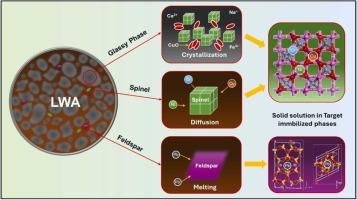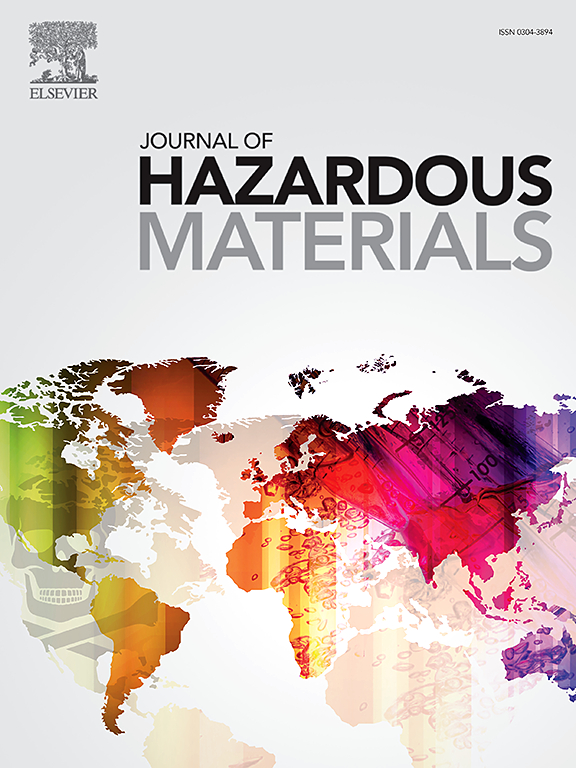Target immobilized phases of heavy metals in hazardous waste based lightweight aggregate
IF 12.2
1区 环境科学与生态学
Q1 ENGINEERING, ENVIRONMENTAL
引用次数: 0
Abstract
The potential leaching risk poses a concern for the large-scale recycling of hazardous waste as lightweight aggregates (LWAs). This paper investigated the combination state of heavy metals in target immobilized phases of LWA through both theoretical calculations and experimental verification. Results reveal that Pb can enter the feldspar crystal cell to form stable interstitial solid solutions, while Cu, Cr, and Ni can replace specific ions in spinel to form replacement solid solutions. The addition of target immobilized phases generally weakened the physical performance of LWAs, while reducing the leaching risk. The appropriate amount of the spinel phase favored the immobilization of Cu, Cr, and Ni, whereas albite contributed to the immobilization of Pb with low leaching values. Due to the lower melting temperature, albite could facilitate the introduction of a high-temperature liquid phase, enhancing the migration of Pb²⁺ for better immobilization in glassy phase. In contrast, anorthite exhibited a higher viscosity at 1100 °C, leading to ineffective physical encapsulation of heavy metal ions by the liquid phase. Heavy metal ions react with additional spinel phase at high temperatures to form stable solid solution phases. This study provides a novel method for regulating heavy metal leaching in hazardous waste-based LWA.

基于危险废物的轻质骨料中重金属的目标固定化阶段
将危险废物作为轻质骨料(LWA)进行大规模回收利用时,潜在的沥滤风险令人担忧。本文通过理论计算和实验验证,研究了重金属在 LWA 目标固定相中的结合状态。结果表明,铅可进入长石晶胞形成稳定的间隙固溶体,而铜、铬和镍可取代尖晶石中的特定离子形成置换固溶体。添加目标固定相通常会削弱 LWA 的物理性能,同时降低浸出风险。适量的尖晶石相有利于固定铜、铬和镍,而白云石则有助于固定浸出值较低的铅。由于白云石的熔化温度较低,因此可以促进高温液相的引入,从而增强铅的迁移,更好地固定在玻璃相中。相比之下,阳起石在 1100 °C时表现出更高的粘度,导致液相对重金属离子的物理包裹效果不佳。重金属离子在高温下与附加尖晶石相反应,形成稳定的固溶相。这项研究为调节基于危险废物的 LWA 中的重金属沥滤提供了一种新方法。
本文章由计算机程序翻译,如有差异,请以英文原文为准。
求助全文
约1分钟内获得全文
求助全文
来源期刊

Journal of Hazardous Materials
工程技术-工程:环境
CiteScore
25.40
自引率
5.90%
发文量
3059
审稿时长
58 days
期刊介绍:
The Journal of Hazardous Materials serves as a global platform for promoting cutting-edge research in the field of Environmental Science and Engineering. Our publication features a wide range of articles, including full-length research papers, review articles, and perspectives, with the aim of enhancing our understanding of the dangers and risks associated with various materials concerning public health and the environment. It is important to note that the term "environmental contaminants" refers specifically to substances that pose hazardous effects through contamination, while excluding those that do not have such impacts on the environment or human health. Moreover, we emphasize the distinction between wastes and hazardous materials in order to provide further clarity on the scope of the journal. We have a keen interest in exploring specific compounds and microbial agents that have adverse effects on the environment.
 求助内容:
求助内容: 应助结果提醒方式:
应助结果提醒方式:


